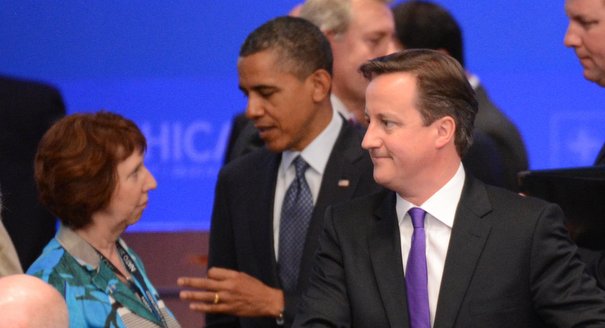David Cameron, Britain’s Prime Minister, must have been chuffed to be invited onto the treadmills for private talks with President Obama during last weekend’s G8 summit at Camp David.
For the British government, this tête-à-tête confirmed the enduring nature of the special relationship between Washington and London. It certainly would like those ties to be so important that they make up for Britain’s self-isolation from the European Union.
Nothing could be further from the truth. The importance of the Washington-London axis is waning. Otherwise Obama would be phoning Cameron regularly. Instead, it is Chancellor Angela Merkel to whom Obama talks a lot.
The fact is that Germany is more important to the United States than Britain. Germany is Europe’s largest and most successful economy. Germany is also the major player inside the European Union.
Over the past two years, Merkel has insisted that debt-ridden eurozone countries introduce tough austerity measures in return for receiving generous financial assistance from the EU’s bailout fund.
Nobody knows yet whether she will be proved right or wrong. But Obama does not like Merkel’s policies. Washington sees the need to balance the books, sort of.
But when growth in the eurozone countries, with the exception of Germany, is miserable, this has repercussions across the Atlantic, as Obama himself said last week.
For Obama, who is in the middle of his re-election campaign, less austerity and some stimulus measures in Europe would be very, very welcome. That is why he keeps trying to convince Merkel to adopt such a position.
Cameron, even though he is very close to Merkel, has no influence on the debate, though he wants to believe he can build bridges between Europe and the United States.
Last week, just before he set off for the G8 and NATO summits, he delivered a scathing attack on Europe’s handling of the euro crisis.
“The eurozone is at a crossroads,” he told business leaders. “It has to make up or it is looking at a potential break-up.”
Cameron then called on Europe to establish an effective firewall and well-capitalized and regulated banks. He also proposed a “system of fiscal burden sharing and supportive monetary policy across the eurozone or we are in uncharted territory which carries huge risk for everyone.”
Cameron has a similar reasoning to Obama’s: a weak eurozone will prolong Britain’s deep economic crisis because of the close trade ties.
The EU accounts for half of Britain’s overall exports of goods and services. Eight out of Britain’s ten main export markets are in the EU. As a result of this economic exchange, around 3.5 million jobs in Britain are linked to the export of goods and services to the EU, according to Britain’s Department for International Development.
The Bank of England, or Central Bank, however, has repeatedly said that Britain’s economic problems are not entirely caused by the eurozone crisis.
That may be true, but having more of a say in Europe would still help.
Cameron should not have stayed out from a EU-wide treaty change ...etc. (he didn't veto otherwise we'd have no changes to the treaty).
That is why Britain is less important to the United States these days: It is not, to quote a cliché, at the heart of the debate in Europe.
Aside from the euro issue, Britain has also lost a lot of its military value to the United States.
Britain is no longer a major military and security power. Its unequivocal support for the American-led war in Iraq and later, the war in Afghanistan, exposed the enormous strains on the British military, as it did on other armed forces.
The fact that Britain last year agreed on a special defense accord with France showed that Britain has neither the financial means nor political will to equip and sustain large armed forces. Military spending is being reduced by over 7 percent until 2015.
Britain will continue to maintain its nuclear weapons. But this policy is coming under increasing scrutiny as a recent hearing by the House of Commons Defense Committee confirmed.
Britain’s military decline worries the United States because Britain is not compensating for this decline by trying to persuade its European allies to make Europe stronger.
And even if it wanted to, it would find out how much its influence in Europe has diminished – precisely because much of that influence used to rest on Britain’s military might.
After all, it was Britain together with France that in 1999 pushed Europe to finally start planning for its own defense. They established “the Helsinki Headline Goal” in which the EU would be able to deploy up to 60,000 troops by 2003 and sustain them for a year.
Britain garnered much praise in Brussels for this initiative, even though reality fell way short of expectations. Eventually, frustrated by the lack of political will in other European capitals, Paris and London went their own way last year.
But Cameron did not realize that Obama wants a Europe that is stronger across the board with Britain influencing it strategically.
To put it unkindly, especially in the light of the treadmill rendez-vous: Britain’s Prime Minister just does not seem to be up to speed.





.jpg)
